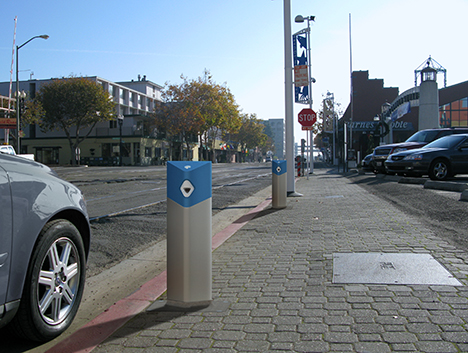Rossland to host electric car charging station? We're applying for a grant...
Rossland has applied for a grant to cover up to 75 per cent of the cost of two “Level 2” electric car charging stations as part of a provincial initiative to increase the reach of electric vehicles across the province.
The move was recommended to council by the Sustainability Commission (SC) at the SC’s July 18 meeting, and council voted unanimously in favour of applying for the grant, although some councillors expressed reservations about whether it was a good idea to give up parking in favour of charge stations.
The “Community Charging Infrastructure Fund” (CCI) is administered by the Fraser Basin Council—a not-for-profit NGO that promotes sustainable projects—and overseen by the BC Ministry of Environment as part of “Plug in BC,” a collaborative initiative with BC Hydro and other organizations that aims to establish infrastructure all over BC to charge electric vehicles.
The Ministry of Environment reports a rise in electric car ownership across BC, and charging stations will increasingly allow these vehicles full access to the province. By Sept. 12, the ministry had already reported plans to install 286 stations for 71 organizations across BC as part of the CCI
City staff reported to council that Rossland’s location along Highway 3B makes it a “likely candidate” for funding . Rossland has applied for two dual-outlet Level 2 charging stations, or which the CCI grant will cover up to $4000 per station, or $16,000 total. Including “point-of-sale capability”—for example, a credit card charge for electricity consumption at the station—would cost a total of $21,333. If Rossland got the grant, it would be required to pay $5333 total.
The SC recommended the city install conduit and a few “stubs” to prepare for future stations and identified the new Thrift Store parking lot or outside City Hall as possible locations for the stations. One parking stall would be dedicated to each dual-outlet station.
The SC minutes say, “This would serve both as a visible signal of Rossland’s forward thinking commitment to greener energy use (good media potential), but would also set us up with options for the future in a highly cost effective manner.”
The SC’s Energy Task Force has volunteered its services, at the city’s discretion, to explore other funding opportunities, maintenance costs, payment options for point-of-sale purchases, and potential locations.
If Rossland gets the grant, council will have to decide where to put the stations—or whether to install them at all. Although visible and central, some councillors already expressed reservations about the Thrift Store parking lot that city staff recommended in their memo.
Mayor Greg Granstrom said, “One thing that should be noted is that, in this time with lots of discussion regarding parking, if you dedicate two parking spots to electric vehicles, then only electric vehicles can use them.”
Coun. Kathy Wallace shared this concern: “I’m certainly in support of applying for the grants and seeing what happens, and it would be a way of getting across the mountains. But on the other hand, when we’ve had such a discussion in the community about parking stalls, and we have our beautiful new Thrift Store parking lot, if we dedicate a couple of those stalls to this, then I’m assuming they can’t be used for simple, straight parking. Is that a correct assumption?”
Granstrom responded, “I don’t believe that’s a correct assumption. If we got the grant money, we’d have to deal with how we make use of it. I think we can apply for it and see where we get.”
Wallace asked, “What about vandalism-proof?”
The mayor said, “I can’t answer that. Once again, I think the motion is to apply for the grants, and then there’s no doubt there will be some issues we have to discuss.”
Coun. Kathy Moore called it a “progressive, proactive initiative.” She said, “It puts us in a position, moving forward, that we’ll be ready to get electric cars to come visit us on their way between Vancouver and Calgary and anywhere else they might be going.”
Coun. Jill Spearn agreed: “It’s incredibly progressive. I don’t think there’s anyone else in our region who has applied or is applying. What I thought was really neat was how many charging stations are seemingly going to be around the whole province. I think it sets our province up for success also, as far as sustainability and the future goes.”
The Ministry of Environment report that a one-hour charge at a Level 2 station gives the vehicle enough power to travel 30 kilometres. They note that a battery-powered electric vehicle costs as little as $300 per year in electricity bills compared to more than $1500 per year in gasoline for a similar gas-powered car.


























